A living will is a legal document that outlines the medical care preferences of an individual if they become incapacitated and can no longer communicate their wishes. Typically, it covers decisions related to life-sustaining treatments, such as whether to be kept on life support, whether to receive artificial nutrition and hydration, and whether to receive pain medication. To ensure that a living will is comprehensive and legally binding, it must meet certain requirements, such as being signed in the presence of witnesses or a notary public, being clear and unambiguous in its language. It must be created by an individual who is of sound mind and capable of making medical decisions. There are different options for making a will. Some may be free such as a holographic will and some online will-maker. Printable forms and templates can be self-filled for between $45 to $75. Although this option is inexpensive, you cannot customize it according to your unique circumstances. Hiring a lawyer to prepare the living will normally cost between $300 and $500. If your estate is bigger and more involved, you will have to pay a higher flat cost. Your price in that situation might be $1,000 or more. With hourly rates, the price of a will changes substantially. Amazon, Staples, and Walmart are just a few places to purchase DIY will kits. This may be an economical answer for those with straightforward estates who are hesitant to enter their information online. It costs a meager amount of $15 to $ 50. Paid online will providers may assign trained specialists to create your will, and mail it directly to your home. If you need to change your will in the future, such providers usually charge for these edits. The cost may range from $50 to $200. The cost of creating a living will vary depending on a number of factors. These include the complexity of the document, the state you live in, and the attorney or service provider you choose. The more complex your living will is, the more expensive it is likely to be. For example, if your living includes detailed instructions for multiple medical scenarios, it will require more time and expertise to draft. Additionally, if your living will involves naming multiple agents or surrogates, the cost can increase. It is important to be mindful of the level of detail you include in your living will and to work with an attorney or legal service provider to determine the appropriate level of complexity. Your state can also impact the cost of creating a living will. Attorneys and legal service providers in urban areas tend to charge more than those in suburban or rural areas. Additionally, each state has its own legal requirements for living wills, which can impact the amount of time and expertise required to draft the document. It is important to work with an attorney or legal service provider licensed to practice law in your state and familiar with the local legal requirements. The attorney or service provider you choose can also impact the cost of creating a living will. Attorneys who specialize in estate planning and elder law tend to charge more than those who do not. Additionally, some legal service providers may charge a flat fee for creating a living will, while others may bill hourly. Researching multiple attorneys and legal service providers can help you find one who fits your budget and needs. When it comes to payment structures for living wills, there are two main options: flat fees and hourly billing. Some attorneys and legal service providers charge a flat fee for creating a living will. This means you will pay a set amount for the document, regardless of how much time and effort is required to draft it. Flat fees can be advantageous for individuals who clearly understand the scope of work required and who want to avoid any unexpected expenses. However, it is important to ensure that the flat fee includes all necessary services, such as reviewing and updating the document in the future. Other attorneys and legal service providers may bill hourly for creating a living will. This means that you will be charged for the amount of time the attorney spends working on your document. Hourly billing can be advantageous for individuals with more complex living wills rather than simple wills, as it ensures that they only pay for the time and expertise required to create the document. However, it can also lead to higher costs if the document ends up being more complex than anticipated. Creating a living will oneself, also known as a DIY living will, is an option for those who want to save money on legal fees. Here is how you can create a living will for free: It is important to research the legal requirements for creating a living will in your state. The requirements can vary from state to state, so it is important to ensure that the document meets all legal requirements. Many online templates and software programs are available for creating a living will. It is important to choose a reputable one and ensure that it is up to date with the legal requirements in your state. Being specific about medical care preferences is important to ensure that the living will accurately reflect the wishes of an individual. This includes instructions for specific medical scenarios and any treatments to be received or refused. There are advantages and disadvantages to creating a DIY living will. Some potential advantages include the following: Lower Cost. Creating a living will oneself can save money on legal fees. Control Over the Process. Individuals have complete control over the creation of their living will and can ensure that it accurately reflects their wishes. However, there are also potential disadvantages to creating a DIY living will, including: Legal Requirements. There are specific legal requirements for creating a living will that must be followed to ensure that the document is legally valid. It is important to research and understand these requirements. Risk of Errors. Without the guidance of an experienced attorney, there is a risk of making errors in the creation of the living will, which can render it invalid. To ensure that a DIY living will is legally valid and comprehensive, there are several tips individuals should follow: Research the Legal Requirements. It is important to research and understand the legal requirements for creating a living will in your state to ensure that the document meets all legal requirements. Use a Reputable Template or Software Program. Choose a reputable and up-to-date online template or software program to create the living will. Be Specific About Medical Care Preferences. Provide clear and specific instructions for medical care preferences, including any treatments to be received or refused. Have the Document Witnessed. In most states, a living will must be witnessed in order to be legally valid. Be sure to follow the witness requirements in your state. Regularly Review and Update the Living Will. Regularly review and update the living will to ensure that it remains current and reflects any changes in medical care preferences or personal circumstances. When deciding whether to create a living will yourself or to hire an attorney or legal service provider, it is important to consider the costs associated with each option. DIY living wills can be less expensive upfront, as you do not need to pay for legal services. However, it is important to be aware of any fees or expenses you may incur in the future, such as if you need to update or revise the document. On the other hand, working with an attorney or legal service provider can be more expensive upfront, but it provides the benefit of having a comprehensive and legally valid document. Additionally, attorneys and legal service providers can provide ongoing support and assistance with updating and revising the document as needed. Regardless of whether you choose to create a living will yourself or to work with an attorney or legal service provider; there are several tips you can follow to ensure that your document is comprehensive and cost-effective. These include: Do Your Research. Research multiple attorneys and legal service providers to find one who fits your budget and needs. Be sure to ask about their payment structures, as well as any additional fees or expenses you may incur. Be Mindful of Complexity. Be mindful of the level of detail you include in your living will. While ensuring that your wishes are clear and comprehensive is important, it is also important to be mindful of the costs associated with a more complex document. Review and Update Regularly. Review and update your living will regularly to ensure it remains current and comprehensive. This can help avoid the need for more extensive revisions in the future, which can be more costly. Consider Your Options. Consider all of your options when it comes to creating a living will, including DIY options and working with an attorney or legal service provider. Be sure to weigh the costs and benefits of each option based on your specific needs and budget. Creating a living will is important in ensuring that your end-of-life care is consistent with your beliefs and values. While the cost of creating a living will can be a significant factor, there are several ways to minimize costs and ensure that the document is comprehensive and legally valid. By being mindful of the factors that impact the cost of living will, choosing the right payment structure, and considering all of your options, you can create a living will that meets your needs and budget. Working with an experienced estate planning attorney or legal service provider is important to ensure that your living will is comprehensive and legally valid. You may also seek services from a financial advisor to help you navigate the ins and outs of a living will. However, if you choose to create a DIY living will, be sure to research the legal requirements in your state and use a reputable template or software program. Finally, reviewing and updating your living will regularly is important to ensure that it remains current and comprehensive. By following these tips, you can create a living will that provides you and your loved ones with peace of mind while also being cost-effective.What Is a Living Will?
Cost of a Living Will
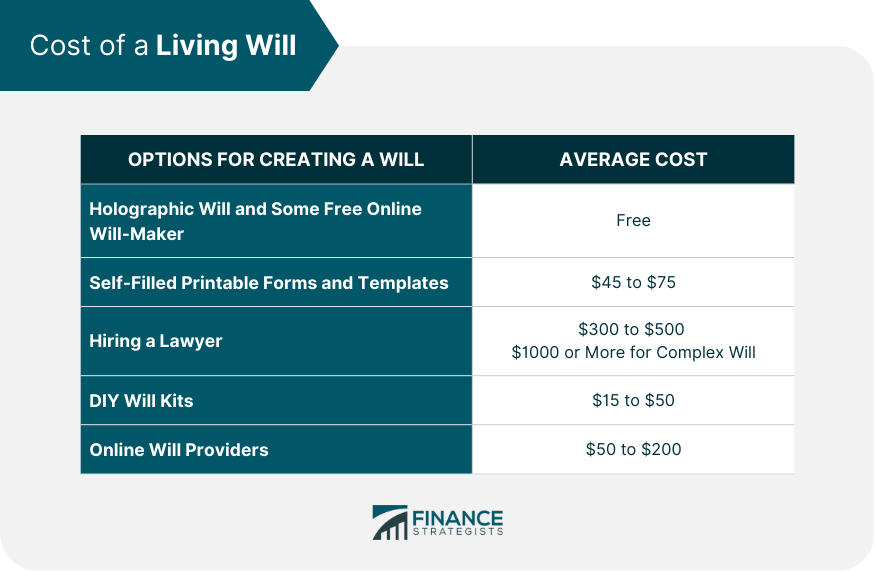
Factors Affecting the Cost of a Living Will
Complexity of the Document
State You Live In
Attorney or Service Provider You Choose
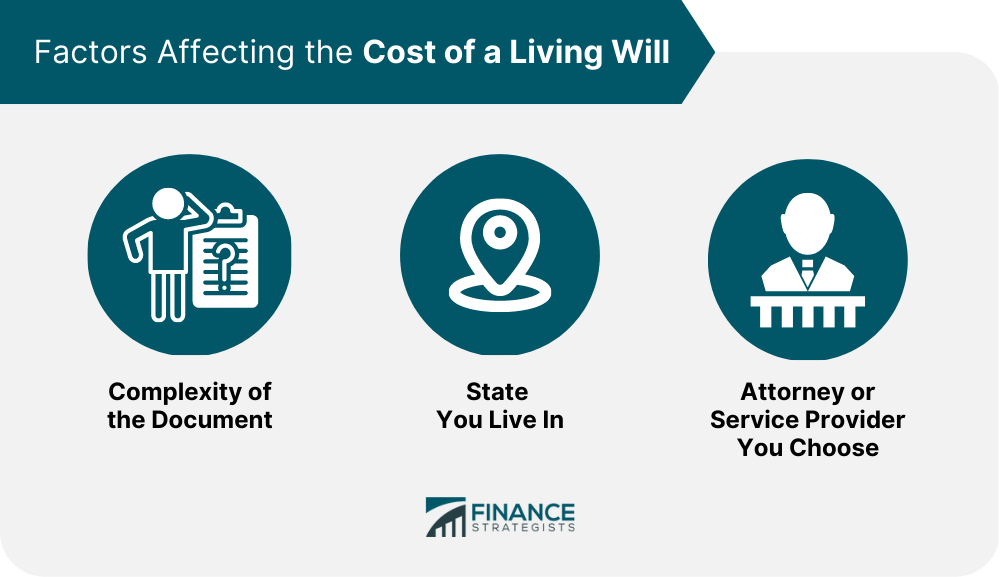
Living Wills Payment Structures
Flat Fees
Hourly Billing
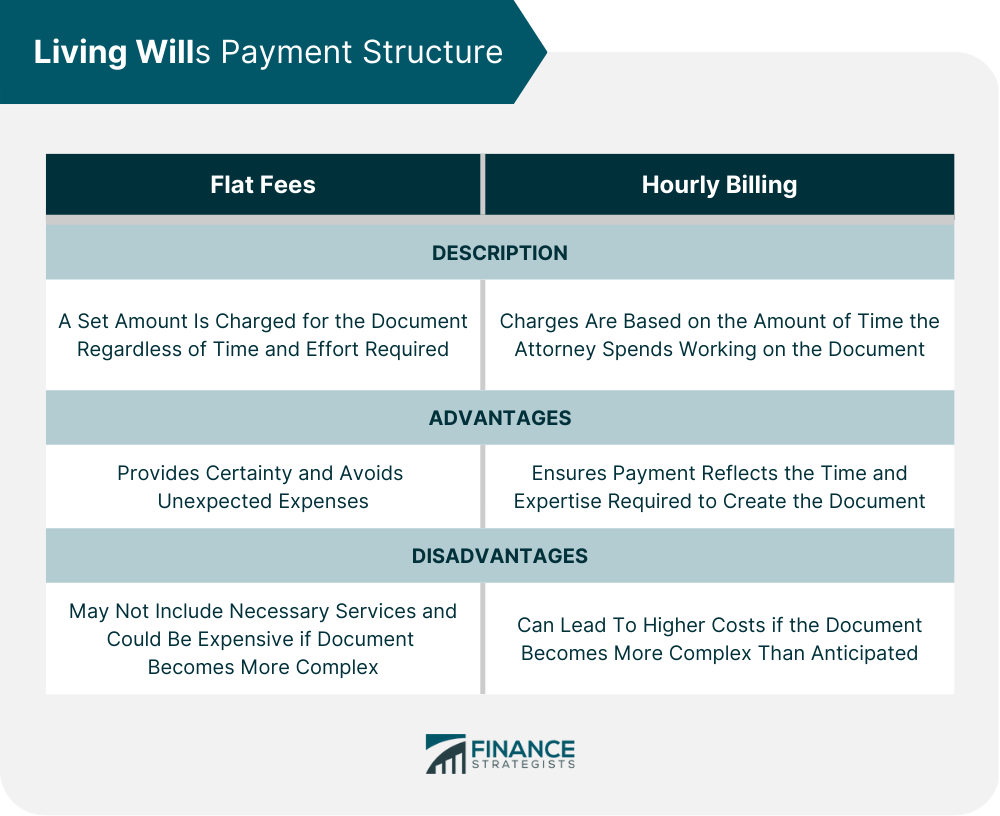
Do-It-Yourself Living Wills
Research the Legal Requirements
Use a Reputable Template or Software Program
Be Specific About Medical Care Preferences
Advantages and Disadvantages of Do-It-Yourself Living Wills
Do-It-Yourself Living Wills Tips
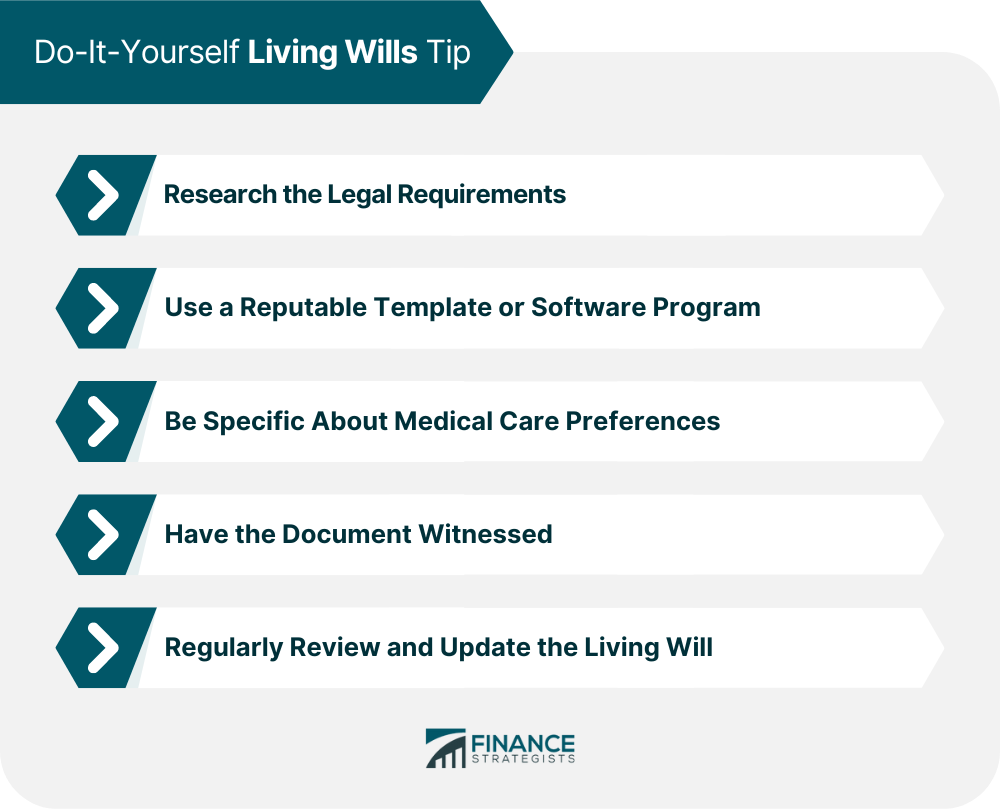
Cost Comparison: Creating a Living Will Yourself vs Hiring an Attorney
Tips for Creating a Comprehensive and Cost-Effective Living Will
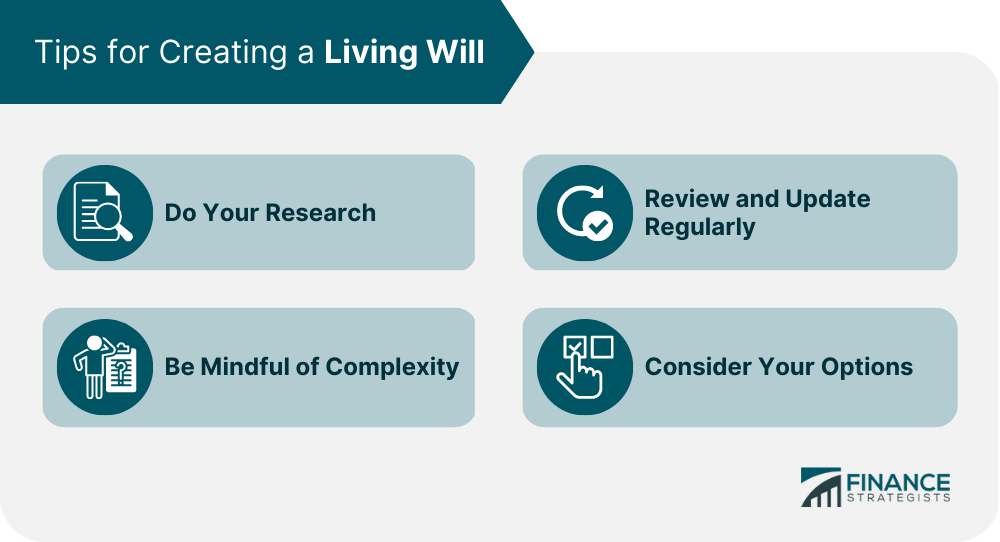
The Bottom Line
Cost of a Living Will FAQs
A living will is a legal document that outlines an individual's medical care preferences if they become incapacitated and can no longer communicate their wishes.
The cost of a living will depends on the document's complexity, the state you live in, and the attorney or service provider you choose.
There are two main payment structures for living wills: flat fees and hourly billing.
To create a DIY living will, research the legal requirements, use a reputable template or software program, and be specific about medical care preferences. However, it is important to note that working with an attorney or legal service provider is recommended to ensure that the document is comprehensive and legally valid.
To minimize the cost of a living will, you can do it yourself using templates and guides available online or use a low-cost online service. Another option is to consult with an estate planning attorney to draft the document, but negotiate the fees upfront and consider using a flat fee instead of hourly billing.
True Tamplin is a published author, public speaker, CEO of UpDigital, and founder of Finance Strategists.
True is a Certified Educator in Personal Finance (CEPF®), author of The Handy Financial Ratios Guide, a member of the Society for Advancing Business Editing and Writing, contributes to his financial education site, Finance Strategists, and has spoken to various financial communities such as the CFA Institute, as well as university students like his Alma mater, Biola University, where he received a bachelor of science in business and data analytics.
To learn more about True, visit his personal website or view his author profiles on Amazon, Nasdaq and Forbes.











